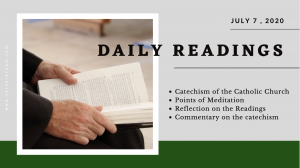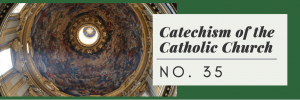
July 7 2020
Tuesday of the Fourteenth Week in Ordinary Time
Reading 1 HOS 8: 4-7, 11-13
Thus says the LORD:
They made kings in Israel, but not by my authority;
they established princes, but without my approval.
With their silver and gold they made
idols for themselves, to their own destruction.
Cast away your calf, O Samaria!
my wrath is kindled against them;
How long will they be unable to attain
innocence in Israel?
The work of an artisan,
no god at all,
Destined for the flames—
such is the calf of Samaria!
When they sow the wind,
they shall reap the whirlwind;
The stalk of grain that forms no ear
can yield no flour;
Even if it could,
strangers would swallow it.
When Ephraim made many altars to expiate sin,
his altars became occasions of sin.
Though I write for him my many ordinances,
they are considered as a stranger’s.
Though they offer sacrifice,
immolate flesh and eat it,
the LORD is not pleased with them.
He shall still remember their guilt
and punish their sins;
they shall return to Egypt.
Responsorial Psalm 115: 3-4, 5-6, 7-8, 9-10
R. (9a) The house of Israel trusts in the Lord.
or:
R. Alleluia.
Our God is in heaven;
whatever he wills, he does.
Their idols are silver and gold,
the handiwork of men.
R. The house of Israel trusts in the Lord.
or:
R. Alleluia.
They have mouths but speak not;
they have eyes but see not;
They have ears but hear not;
they have noses but smell not.
R. The house of Israel trusts in the Lord.
or:
R. Alleluia.
They have hands but feel not;
they have feet but walk not.
Their makers shall be like them,
everyone that trusts in them.
R. The house of Israel trusts in the Lord.
or:
R. Alleluia.
Alleluia JN 10:14
R. Alleluia, alleluia.
I am the good shepherd, says the Lord;
I know my sheep, and mine know me.
R. Alleluia, alleluia.
Gospel MT 9:32-38
A demoniac who could not speak was brought to Jesus,
and when the demon was driven out the mute man spoke.
The crowds were amazed and said,
“Nothing like this has ever been seen in Israel.”
But the Pharisees said,
“He drives out demons by the prince of demons.”
Jesus went around to all the towns and villages,
teaching in their synagogues,
proclaiming the Gospel of the Kingdom,
and curing every disease and illness.
At the sight of the crowds, his heart was moved with pity for them
because they were troubled and abandoned,
like sheep without a shepherd.
Then he said to his disciples,
“The harvest is abundant but the laborers are few;
so ask the master of the harvest
to send out laborers for his harvest.”

Catechism of the Catholic Church
35 Man’s faculties make him capable of coming to a knowledge of the existence of a personal God. But for man to be able to enter into real intimacy with him, God willed both to reveal himself to man, and to give him the grace of being able to welcome this revelation in faith.(so) the proofs of God’s existence, however, can predispose one to faith and help one to see that faith is not opposed to reason.
 “For greater things you were born.” (Ven. Mother Luisita)
“For greater things you were born.” (Ven. Mother Luisita)
TUESDAY, JULY 77H Mt. 9:32-38 Jesus said to his disciples, “The harvest is abundant but the laborers are few. Ask the master of the harvest to send out laborers for his harvest.”
- In today’s Gospel, Jesus heart is moved with pity. “At the sight of the crowds, his heart was moved with pity for them because they were troubled and abandoned, like sheep without a shepherd.”
- Undoubtedly we need to pray intensely for vocations to the Priesthood and Religious life. They are the heralds of the kingdom of God in our midst! They are a visible sign of the life in Christ we are all called to live! The eternal values we are bound to uphold!
- That said, we are all called to be laborers in the Lord’s vineyard – no Christian is excused! And where are we called to work? Most of us, right where we are planted! In the most unglamorous, least appreciated, often unnoticed venues – our family… work place… neighborhood! Wherever there is a need.
- But first we must encounter Christ daily! If not, we have nothing to give.
Encountering Christ… Father Gabriel of Saint Mary Magadalen O.C.D. (+1953)
Yes, I know that as long as I do not look upon creatures with that simple, profound glance of faith which enables me to find you in all of them, O my God, to deal with them, even when duty requires it, will always be an obstacle and an impediment to my interior recollection.
O my God, grant me the single eye mentioned in the Gospel, that eye which can pierce through exterior appearances and fix its gaze on that divine mark which you yourself have imprinted on every human being.
Then I shall make no distinction between those who are congenial and attractive, and those who are mean, disagreeable, or repulsive; all these “externals” will disappear and I shall recognize your face in everyone, and shall serve and love you, my God.
Shall I then be able to complain that the relations with my neighbor which duty imposes or the things I have to do for him distract me from you? Does not faith tell me that in treating with my brethren I am treating with you, and that when I serve them I am serving you? Did not Jesus say, “As long as you did it to one of these my least brethren, you did it to me”? (Mt. 25:40)
You dwell in the soul of everyone who is in the state of grace just as you dwell in mine and if, unfortunately, all people are not in the state of grace, all are capable of receiving grace; all are the objects of your merciful love; all are called, by vocation, to be temples of the Blessed Trinity. Then, O Lord, if I wish to seek you within myself, why do I not seek you also in my brethren?
O my God, purify my sight which is so easily deceived by human appearances, and make it capable of discovering you and finding you in every creature! End of Reflection
Christianity Must Generate Saints… Servant of God Dorothy Day (+1980) Co-Founder of Catholic Worker Movement
A few years ago I had to call in a woman doctor, an exile, who had been in a concentration camp in Germany for refusing to sterilize epileptic children. She was taking care of one of the women in the house. As she left she said, recognizing the apparent hopelessness of our work for the most destitute, “The only thing you can do for these sick and aged ones is to make them happy.”
I have often thought of that since, when people have asked us about the work, what we were trying to do, it seemed very simple to say, “We are trying to make people happy.” We want to be happy, we want others to be happy, we want to see some of this joy of life which children have, we want to see people intoxicated with God, or just filled with the good steady joy of knowing that Christ is King and that we are His flock and He has prepared for us a kingdom, and that God loves us as a father loves his children, as a bridegroom loves his bride, and that eye hath not seen nor ear heard what God hath prepared for us!
Father Henri du Lubac, S.J. wrote recently, “It is not the proper duty of Christianity to form leaders – that is, builders of the temporal, although a legion of Christian leaders is definitely desirable. Christianity must generate saints – that is, witnesses to the eternal. The efficacy of the saint is not that of the leader. The saint does not have to bring about great temporal achievements; he is one who succeeds in giving us at least a glimpse of eternity despite the thick opacity of time.” End of Reflection
Let Our Yes Mean Yes… by Servant of God Dorothy Day (+1980)
When I became a Catholic, it never occurred to me to question how much freedom I had or how much authority the Church had to limit that freedom. I had reached the point where I wanted to obey. I was like the child in the New Yorker cartoon (I was nearly thirty years old) who said, “Do I have to do what I want to do today?”
I was tired of following the devices and desires of my own heart, of doing what I wanted to do, what my desires told me I wanted to do, which always seemed to lead me astray. Obedient to my conscience, I became a Catholic, was conditionally baptized and said, “I do believe,” to the great and solemn and beautiful truths proposed to me. And so, when it comes to divorce, birth control, abortion, I must write in this way. The teaching of Christ, the Word, must be upheld.
The Church held up a tremendous ideal for the follower of Christ, and no matter how many times one failed, fell flat on one’s face, one might say, the Church, Holy Mother Church, was there with her Sacraments of Penance and Holy Eucharist to reassure and forgive and sustain and nourish one. End of Reflection
The Love and Compassion of the Cross… by Servant of God Dorothy Day (+1980)
How to draw a picture of the strength of love! It seems at times that we need a blind faith to believe in it at all. There is so much failure all about us. It is so hard to reconcile oneself to such suffering, such long-enduring suffering of body and soul that the only thing one can do is to stand by the dying ones who have given up hope of reaching out for beauty, joy, ease, and pleasure in this life. For all their reaching, they got little of it.
To see these things in the light of faith, God’s mercy! God’s justice! His devouring love! I read one story of the death of the Little Flower, and her death was just as harrowing in its suffering as that of Mary’s Katie. Her flesh was a mass of sores, her bones protruded through her skin, she was a living skeleton, a victim of love. We have not such compassion, nor ever will have. What we do is so little.
The stink of the world’s injustice and the world’s indifference is all around us. Compassion – it is a word meaning to suffer with. If we all carry a little of the burden, it will be lightened. If we share in the suffering of the world, then some will not have to endure so heavy an affliction. It evens out. What you do here in New York, in Harrisburg helps those in China, India, South Africa, Europe, Russia, as well as in the oasis where you are. You may think you are alone. But we are members of one another. We are children of God together. End of Reflection
This last article is written about Dorothy Day with a glimpse why she is called Servant of God…
Dorothy Day and the Coffee Cup… by Father Kevin J. O’Reilly
One of the most inspiring Catholic converts of the past century was Servant of God Dorothy Day (1897-1980), who was praised recently by both Pope Francis and Pope Benedict XVI for her holiness and her heroic work with the poor. She was a social activist greatly admired by believers and non-believers alike. However, many of her atheist colleagues regularly asked about her simultaneous devotion to the poor and to her Catholic Faith. How could she be so dedicated to those in poverty, and yet believe in Jesus Christ at the same time?
The answer became clear one day in the early 1970’s when a young priest was invited to say Mass at the offices of the Catholic Worker newspaper. There are various accounts of what happened that day, but eyewitnesses report that, while preparing for Mass, the priest strangely asked Dorothy Day for a ceramic coffee cup. Thinking nothing of it, she gave him the cup, only to be shocked minutes later to see that same cup used as the chalice for Mass. The priest, who was clearly having personal issues, celebrated Mass with the coffee cup and, after Mass, angrily threw the cup in the garbage and stormed off.
People were horrified. Yet, without saying a word, Dorothy Day approached the garbage can and genuflected before it. Then, she took the coffee cup out of the garbage and kissed it. Thereafter, she went out to the yard behind the office, took a shovel, dug a hole, and buried the cup. Finally, she genuflected before the patch of dirt.
Why? To her, that coffee cup had become a sacred object, as it had held the Blood of Christ and could no longer return to being a coffee cup. One witness said that “I learned more that day about the Eucharist than from any book or sermon.” Furthermore, it is said that the priest, moved by her actions, never celebrated Mass disrespectfully again.
What this incident made clear was that her love for Christ was at the heart of everything Dorothy Day ever did. She had encountered the Lord in the Eucharist and always sought to bring Christ to all she met. This is what inspired Dorothy Day to work with the poor, and why she remains an example of holiness for all of us. As Catholics, we are not members of a social services organization, but we seek to help others because we have met Jesus Christ in the Eucharist, have been transformed by Him, and want others to encounter Him too.
At the Mass of the Lord’s Supper on Holy Thursday, we read the account of our Lord’s washing of the feet of His disciples, during which the Lord says, As I have done for you, you should also do. In this passage, the Gospel of John reveals how we should respond to the Lord’s gift of His Body and Blood: we must follow Christ’s example by giving of ourselves through our acts of generosity and mercy, most especially to the poor and needy.
In our doing so, may we, like Dorothy Day, inspire others to learn more about the Eucharist and to see Christ’s love for us everywhere, even in a coffee cup.